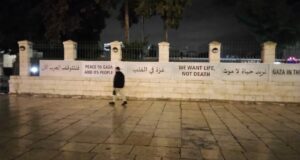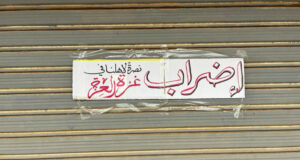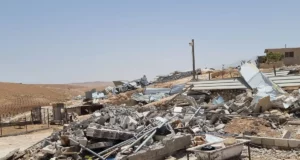posted in the Canberra Times May 18th
Every Friday for the last fifteen months Palestinian farmers from the West Bank village of Bil’in and their Israeli and international supporters have marched out of the village to reach their lands on the other side of the “Separation Barrier” Israel is building to confiscate 500 acres of their farmland. When they get to within a hundred metres of the barrier, Israeli soldiers and border policemen have attacked them with clubs, rifle butts, tear gas and rubber coated metal bullets.
The large number of Israelis engaged in these demonstrations is a matter of considerable embarrassment for the Israeli government, which insists the barrier is merely a security measure, intended to protect Israel from Palestinian terrorism.
The Palestinians, their Israeli allies, the International Court of Justice and the United Nations, however, reject this claim, noting that only 10% of the 650km barrier is being built along Israel’s border while the rest reaches deep inside the West Bank to annex precious land and water resources which are being taken over by neighbouring Jewish settlements.
Last Friday ten Palestinians and two international protestors were injured in the protest, including Phil Reese, a Sydney man who was shot in the head by a rubber coated metal bullet while filming the demonstration.
The following day Mary Baxter, a 75 year old human rights worker from Melbourne, was pelted with stones to her head and back by a group of teenagers from the Israeli settlement of Tel Rumeida as she accompanied Palestinian children returning home from school in the West Bank town of Hebron.
Reese and Baxter are both volunteers with the International Solidarity Movement (ISM) – an organisation of international peace activists who travel to the Occupied Territories to help Palestinians resist occupation and dispossession through non-violent direct action.
Being an ISM volunteer is dangerous work. In 2003 an activist was crushed to death by an Israeli bulldozer and another was killed when he was shot in the head by an Israeli sniper. Two other Australian activists have been wounded by live ammunition.
Although the Australian government was quick to denounce Hamas for not condemning last month’s suicide bombing in Tel Aviv, it has consistently refused to protest Israeli violence towards Palestinians and Australian peace activists.
This double standard is regrettable because if Hamas is to acquiesce to the international community’s demands that they “renounce violence”, it will have to be offered an alternative strategy for resisting Israel’s occupation and colonisation of the West Bank and East Jerusalem. While the militant Palestinian resistance can point to the success of the armed struggle in forcing Israel to withdraw its settlers from the Gaza Strip, no such
successes can be claimed by communities such as Bil’in.
Though for the past 16 months Hamas has scrupulously observed a unilateral Palestinian ceasefire arranged by Palestinian President Mahmoud Abbas, its leaders are acutely aware that they owe their electoral success primarily to the Fateh Party’s disastrous strategy of renouncing violence in favour of the Oslo Peace Process which Israel used as cover to double the number of settlers in the Occupied Territories.
If Hamas is to meet Australian demands that it renounce violence, it is imperative that some form of peace dividend be offered to the Palestinians. At minimum this would mean calling upon Israel to cease confiscating Palestinian land and supporting the work of Australians like Reese and Baxter who daily risk life and limb to uphold international law and the human rights of the Palestinian people.
Encouraging Palestinian restraint, however, does not seem to be a priority in Australian politics. In his address to the Australian Parliament Tony Blair stated that the international community must redouble its efforts to find a solution to the conflict involving a secure state of Israel and a viable, independent Palestinian state. When Greens Senator Kerry Nettle proposed a motion endorsing his statement, government and opposition senators joined forces to defeat it.
According to a report by the Israeli Information Centre for Human Rights in the Occupied Territories, B’Tselem, Israel has created a regime of separation in the Occupied Territories “applying two separate systems of law in the same area and basing the rights of individuals on their nationality.”The report concludes that: “This system is the only one of its kind in the world and is reminiscent of the distasteful regimes of the past, such as the apartheid regime of South Africa.”
In the 1980s the Australian government understood that the key to peace in South Africa was to support progressive forces in the country that were working to end apartheid.
Today Australian politicians seem to believe that peace in the Middle East can be separated from issues of occupation and human rights.
Perhaps it is time to reconsider this assumption?
Michael Shaik is a former International Solidarity Movement Coordinator and a member of Australians for Justice and Peace in Palestine.
 International Solidarity Movement Nonviolence. Justice. Freedom.
International Solidarity Movement Nonviolence. Justice. Freedom.


